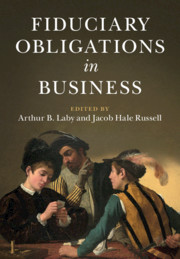Book contents
- Fiduciary Obligations in Business
- Fiduciary Obligations in Business
- Copyright page
- Dedication
- Contents
- Contributors
- Editors’ Acknowledgments
- Introduction The Decline and Rise of Fiduciary Obligations in Business
- Part I Identifying Fiduciaries and Their Duties
- Part II Gaps and Alternatives in Fiduciary Regimes
- Part III Historical and Comparative Perspectives
- Part IV Stakeholders and Society
- 15 Corporations, Directors’ Duties, and the Public/Private Divide
- 16 Stakeholder Impartiality: A New Classic Approach for the Objectives of the Corporation
- 17 Shareholder Primacy in Benefit Corporations
- 18 Self-Interested Fiduciaries and Invulnerable Beneficiaries: When Fiduciary Duties Do Not Fit
- Index
18 - Self-Interested Fiduciaries and Invulnerable Beneficiaries: When Fiduciary Duties Do Not Fit
from Part IV - Stakeholders and Society
Published online by Cambridge University Press: 20 August 2021
- Fiduciary Obligations in Business
- Fiduciary Obligations in Business
- Copyright page
- Dedication
- Contents
- Contributors
- Editors’ Acknowledgments
- Introduction The Decline and Rise of Fiduciary Obligations in Business
- Part I Identifying Fiduciaries and Their Duties
- Part II Gaps and Alternatives in Fiduciary Regimes
- Part III Historical and Comparative Perspectives
- Part IV Stakeholders and Society
- 15 Corporations, Directors’ Duties, and the Public/Private Divide
- 16 Stakeholder Impartiality: A New Classic Approach for the Objectives of the Corporation
- 17 Shareholder Primacy in Benefit Corporations
- 18 Self-Interested Fiduciaries and Invulnerable Beneficiaries: When Fiduciary Duties Do Not Fit
- Index
Summary
Courts, practitioners, and academics alike have long considered corporate officers and directors to be fiduciaries of the public corporation and its shareholders. As corporate law has evolved, however, with the business judgment rule strengthening, the duties of care and loyalty narrowing in scope, and executive compensation schemes further introducing self-interest into corporate decision making, the fiduciary paradigm is no longer an accurate description of the nature of the relationship between corporate managers and the corporation. Corporate officers and directors have significant latitude to make decisions that take into consideration their self-interest while still satisfying their duties to the corporation. Further, the “best interests” of the corporate entity and its multitude of stakeholders are highly variable and often ill-defined, such that it would be impractical to pursue those interests as a singular goal. This Article argues that corporate officers and directors are not governed by fiduciary duties in the truest sense of the term. This misconceptualization inhibits an accurate understanding of the dynamics underlying corporate decision
Keywords
- Type
- Chapter
- Information
- Fiduciary Obligations in Business , pp. 334 - 349Publisher: Cambridge University PressPrint publication year: 2021

